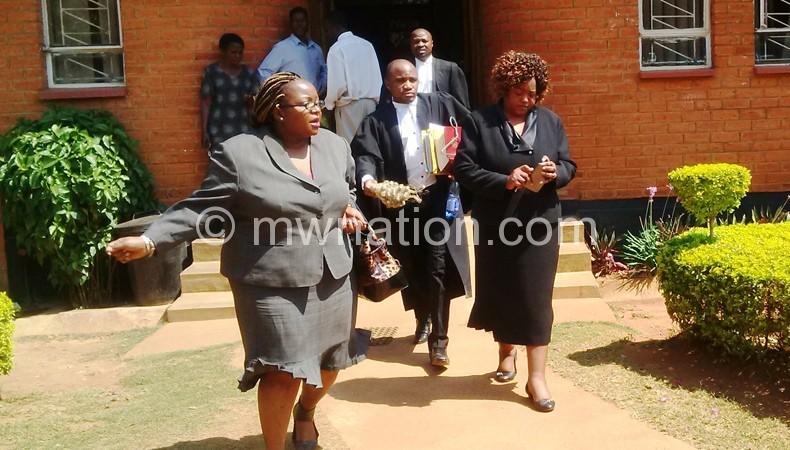2014 Review: The year Cashgate went on trial
When scores of Malawians from the public and private sectors were arrested in the last part of 2013 in connection with the plunder of public resources that came to be infamously dubbed Cashgate, there was scepticism that justice would be delivered.
In February this year, a forensic audit report by British firm Baker Tilly found that close to K14 billion was unscrupulously siphoned from public coffers and people wanted heads to roll.

About 12 months down the road, the fears and scepticism have come to pass.
Since February 2014 when the Cashgate trials started in earnest, the prosecution teams of the Director of Public Prosecutions (DPP) and the Anti-Corruption Bureau (ACB) as providers of evidence against the accused persons have managed to successfully secure conviction of two people.
As of October 30 2014 when the prosecution of Cashgate suspects was further derailed by a strike by Judiciary support staff, there were 25 cases which had commenced at the courts in Lilongwe and Zomba, some awaiting judgement while hearing for those involving huge amounts of money had not yet commenced.
The much awaited trial of people suspected to have shamelessly plundered the country’s financial resources from source started off on a low note as Malawians came to know a court procedure known as preliminary objections.
Malawians came to realise that prosecution of Cashgate suspects would not be as easy as expected and demanded by various sections of society including donors who did not hesitate to put prosecution as a condition for resumption of aid.
The defence lawyers representing the Cashgate suspects took advantage of the prosecution’s laxity to object to issues including the framing of the charge sheet and the prosecutors whose services government sourced from outside the public service, notably former DPP Kamudoni Nyasulu and former Ombudsman Enoch Chibwana.
Something as supposedly minor as the service of witness statements between prosecution and defence could delay a case by up to four weeks, as observed in the K24 million case involving Luke Kasamba and Maxwell Namata.
Midway in the cases, there was a change in the head of prosecutions, Mary Kachale replaced Bruno Kalemba in September. The new DPP had a new approach to the cases which included consolidation of several cases.
But going into 2015 with over 20 cases still outstanding, the prosecution will have to find a replacement for Nyasulu whose contract with government is due to expire.
Nyasulu has so far secured several ‘case to answer’ findings involving several Cashgate suspects most importantly the conviction of the first ever Cashgate suspect, accounts assistant in government Victor Sithole.
Sentencing and convictions
The first three convictions and sentencing of Cashgate suspects between September and October were received with mixed feelings among Malawians.
Former principal secretary in the Ministry of Tourism Tressa Senzani was sentenced to nine months for theft and three years for money laundering after she pleaded guilty to misusing K63.5 million from government through her private company, Visual Impact.
While the majority of society described Senzani’s sentencing as too lenient, the ACB was happy with the court’s decision.
But the Lilongwe Magistrate’s Court played to people’s frustrations with the Senzani sentence and meted out a nine-year sentence to accounts assistant Victor Sithole.
The 27-year-old was sentenced to seven years imprisonment for money laundering, one year for possession of stolen money and one year for illegal possession of forex. When he was arrested in September, 2013, he had at his house K112 million, $31 850 and R122 000 which the court ordered should be forfeited to the State.
Sithole has denied that the money belonged to him, but to businessperson Oswald Lutepo who is also answering his theft and money laundering charges.
But surprisingly, that route of evidence was not vigorously followed and the unanswered questions remain in the Sithole case: Who did the money belong to? How did a government-employed accounts assistant come to be in possession of such large amounts of money and lead an expensive life on a K25 000 gross monthly salary?
Malawi Congress Party (MCP) deputy director for youth Wyson Dzinyemba Soko became the third person to be convicted in Cashgate for his possession of K41 million in his company Watipaso General Dealers which did not have a contract with government.
But just like Sithole case, the prosecution and defence did not explore Soko’s claims that the money did not belong to him but to a certain Godfrey Banda who the court could not trace.
Conduct of judges
The High Court and magistrate court in Lilongwe were identified as the hub of Cashgate trials and the responsibility to deliver justice rested in the hands of three judges: Ivy Kamanga, Esmie Chombo and Fiona Mwale.
To ensure maximum coverage, judges Ken Manda and Annabel Mtalimanja were borrowed from the Commercial Division of the High Court to assist.
In the course of the year, newly appointed Lloyd Muhara joined the judges in the trials while Redson Kapindu was given the Lutepo case in Zomba.
But it was Justice Michael Mtambo who was travelling from Blantyre tasked with what has become a Cashgate-related alleged attempted murder of former budget director Paul Mphwiyo who had no patience for delaying tactics of either prosecution or defence.
Going forward
The ACB and office of DPP have under prosecution 26 cases, many of which are yet to start hearing or await pleas and directions more than a year after arrests were affected.
Governance commentator Timothy Mtambo says the progress so far has left a lot to be desired and the court’s decisions have left a sour taste in the mouth of Malawians who expected much more stringent sentences.
He says it is even more disheartening that there is little progress on cases of those who are facing theft charges of bigger amounts.
However, the Judiciary strike remains unresolved and this has derailed several Cashgate cases which were slated for November and December with a likelihood of spilling over into 2015.





